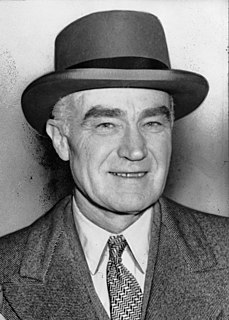A Quote by Theodore Roosevelt
The one characteristic more essential than any other is foresight... It should be the growing nation with a future which takes the long look ahead.
Related Quotes
I will insist the Hebrews have [contributed] more to civilize men than any other nation. If I was an atheist and believed in blind eternal fate, I should still believe that fate had ordained the Jews to be the most essential instrument for civilizing the nations. They are the most glorious nation that ever inhabited this Earth. The Romans and their empire were but a bubble in comparison to the Jews. They have given religion to three-quarters of the globe and have influenced the affairs of mankind more and more happily than any other nation, ancient or modern.
America may not be the best nation on earth, but it has conceived loftier ideals and dreamed higher dreams than any other nation. America is a heterogeneous nation of many different people of different races, religions, and creeds. Should this experiment go forth and prosper, we will have offered humans a new way to look at life; should it fail, we will simply go the way of all failed civilizations.
After a while the business end of writing takes too much of the writing time. Better to pay someone ten percent and find that you're still more than ten percent ahead in the end. Which is true. My present agent says that he always feels that a good agent during the course of a year should earn back for his client at least the ten percent he takes by way of commission, so the client's really nothing out. And what he should ideally do is make him more money than the ten percent.
Besides the advantage of being armed, which the Americans possess over the people of almost every other nation, the existence of subordinate governments, to which the people are attached, and by which the militia officers are appointed, forms a barrier against the enterprises of ambition, more insurmountable than any which a simple government of any form can admit of.
I do not see why the axiom of Prudence should not be questioned, when it conflicts with present inclination, on a ground similar to that on which Egoists refuse to admit the axiom of Rational Benevolence. If the Utilitarian has to answer the question, 'Why should I sacrifice my own happiness for the greater happiness of another?' it must surely be admissible to ask the Egoist 'Why should I sacrifice a present pleasure for a greater one in the future? Why should I concern myself about my own future feelings any more than about the feelings of other persons?'
The man who has successfully solved the problem of his relations with the two worlds of data and symbols is a man who has no beliefs. With regard to the problems of practical life he entertains a series of working hypotheses, which serve his purposes, but are taken no more seriously than any other kind of tool or instrument. In other words, symbols should never be raised to the rank of dogmas, nor should any system be regarded as more than a provisional convenience.






























